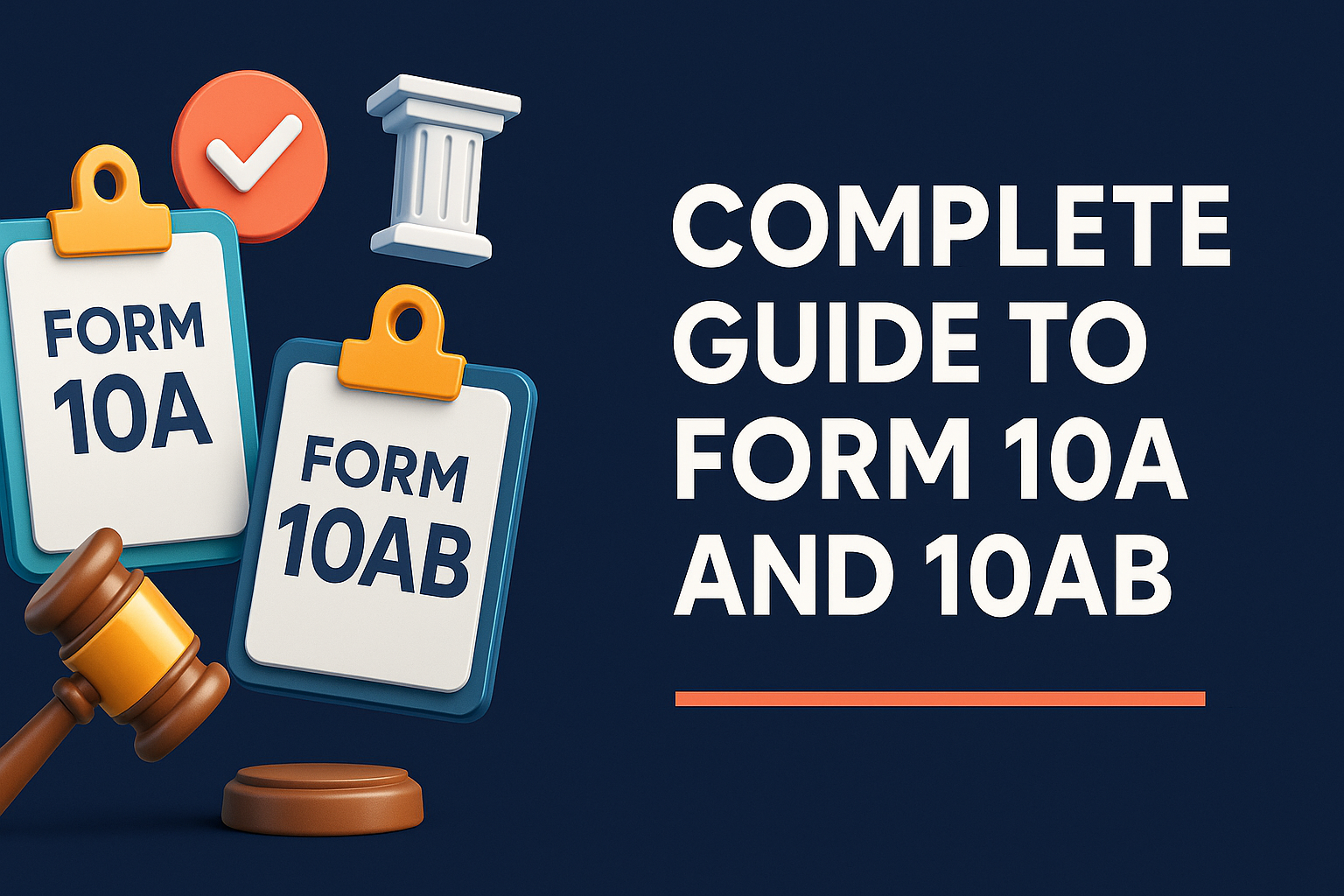
Complete Guide to Form 10A and 10AB–
New Compliance Framework for 12AB Registration
Introduction
Charitable trusts, societies, and Section 8 companies in India rely on tax exemptions under the Income Tax Act, 1961, to maximize their resources for social good. The Finance Act, 2020, introduced Section 12AB, replacing Sections 12A and 12AA, to streamline the registration process for NGOs seeking tax exemptions. Forms 10A and 10AB are central to this new framework, enabling NGOs to obtain and maintain registration under Section 12AB, which is essential for claiming exemptions under Sections 11, 12, 80G, and 10(23C). This section provides a comprehensive exploration of the procedural intricacies, eligibility criteria, documentation requirements, and practical implications of these forms, ensuring NGOs can comply with the law and sustain their operations.
Legal Framework
Section 12AB, effective from April 1, 2021, governs the registration of charitable trusts and institutions, as mandated by the Finance Act, 2020. Rule 17A of the Income Tax Rules, 1962, prescribes Forms 10A and 10AB for registration and renewal, respectively, streamlining the application process. The Taxation and Other Laws (Relaxation and Amendment of Certain Provisions) Act, 2020, deferred the implementation to April 1, 2021, in response to the economic disruptions caused by the COVID-19 pandemic. The framework introduces two types of registration: – Provisional Registration: Valid for three years, designed for new NGOs to establish operations. – Permanent Registration: Valid for five years, renewable, for existing NGOs or those transitioning from provisional registration.
The Central Board of Direct Taxes (CBDT) oversees compliance through the Income Tax Department’s e-filing portal, ensuring transparency and efficiency.
Form 10A: Initial Registration
Form 10A is the application form for initial registration under Section 12AB, applicable in two primary scenarios:
Eligibility Criteria:
Required Documents:
Filing Process:
Example: “Bright Future Trust,” a new NGO established in August 2024 to provide free education to underprivileged children, files Form 10A on February 1, 2025, submitting its trust deed, PAN card, and planned activity report. On July 15, 2025, it receives provisional registration in Form 10AC, valid until March 31, 2028, enabling it to claim tax exemptions for its initial three years of operation.
Form 10AB: Renewal and Conversion
Form 10AB is used for two purposes:
Eligibility Criteria:
Required Documents:
Filing Process:
Example: “Bright Future Trust,” holding provisional registration until March 31, 2028, files Form 10AB on September 1, 2027, to convert to permanent registration. It submits audited financial statements for FY 2024-25 to FY 2026-27 and an activity report detailing 500 students educated. On February 15, 2028, it receives permanent registration in Form 10AD, valid until February 14, 2033.
Provisional vs. Permanent Registration
Table 1: Provisional vs. Permanent Registration
| Aspect | Provisional (Form 10A) | Permanent (Form 10AB) |
| Validity | 3 years | 5 years |
| Application Timing | 1 month before activities begin | 6 months before expiry or activity start |
| Purpose | Initial registration for new NGOs | Renewal or conversion to permanent |
| Order Form | 10AC | 10AD |
Pros and Cons
Pros:
Cons:
Practical Challenges
Reforms and Solutions
Recent Updates (2025)
As of June 8, 2025, the CBDT has not announced new extensions for Form 10AB filings beyond the September 30, 2022, deadline provided for certain cases under Circular No. 7/2022. NGOs with provisional registrations expiring in 2025 must file Form 10AB six months in advance to avoid lapses. The Finance Act, 2025, has not introduced amendments to Section 12AB, but increased scrutiny of NGO compliance underscores the importance of timely filings.
Conclusion
Forms 10A and 10AB are pivotal for NGOs to secure and maintain tax-exempt status under Section 12AB, enabling them to maximize resources for charitable activities. Proper documentation, adherence to deadlines, and robust compliance practices are essential to navigate this framework successfully, ensuring NGOs can sustain their operations and impact
How to Apply for CSR Registration on MCA Portal Under Section 135 of the Companies Act and the C...
Government Grants: An Exhaustive Analysis Under Income Tax Law and Ind AS Framework Government...
A Complete Guide to Legal Structure, Registration, and Taxation of NPOs in India Introduction ...
Private trusts serve as powerful tools for asset management and wealth preservation, but understan...
Impact of Mandatory Aadhaar Linking for NGO Trustees – Legal Validity & Privacy Concer...
Understanding the Concept of Corpus Fund – Treatment Under Income Tax & FCRA ...
PUBLIC INSTITUTIONS EXEMPT FROM TAX [SECTION 10] The Income Tax Act of India, under S...
Understanding Societies in India: Formation, Governance, and Legal Framework Introduc...
Charitable Organisations – Taxation & Compliance (Legal Research Guide) Th...
Understanding Charitable Trusts in India In India, the most commonly understood form of constitut...